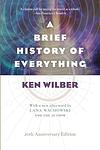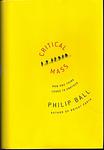10 of the Best Popular Science Books as Chosen by Authors and Writers
This is one of the 286 lists we use to generate our main The Greatest Books list.
-
Silent Spring by Rachel Carson
This influential environmental science book presents a detailed and passionate argument against the overuse of pesticides in the mid-20th century. The author meticulously describes the harmful effects of these chemicals on the environment, particularly on birds, hence the metaphor of a 'silent spring' without bird song. The book played a significant role in advancing the global environmental movement and led to a nationwide ban on DDT and other pesticides in the United States.
-
The Emperor of All Maladies: A Biography of Cancer by Siddhartha Mukherjee
This book is a comprehensive history of cancer, its treatments, and the ongoing search for a cure. It presents an in-depth exploration of the disease from its first documented appearances thousands of years ago through the epic battles in the twentieth century to cure, control, and conquer it, to a radical new understanding of its essence. The book also discusses the politics of cancer research, the impact of patient activism, and the complex and often fraught relationships between researchers, oncologists, and patients.
-
Chaos by James Gleick
This book delves into the complex world of chaos theory, a branch of mathematics that studies the behavior of dynamic systems highly sensitive to initial conditions, often referred to as the butterfly effect. Through engaging storytelling, the narrative explores the pioneering work of scientists who uncovered patterns in what seemed to be randomness, from weather systems to population growth. It charts the evolution of chaos theory from a scientific curiosity to a field that has profound implications across disciplines, offering insights into the inherent unpredictability of nature and the universe. The book makes a compelling case for the beauty and universality of chaos, transforming how we understand the interconnectedness of the world around us.
-
Junk Food Monkeys by Robert Sapolsky
This book delves into the complex behaviors of primates, including humans, and the surprising parallels between them. Through a series of engaging and thought-provoking essays, the author, a renowned biologist, explores how stress, hierarchy, aggression, and personality traits manifest similarly across species. Drawing from his extensive research in the African savanna and insights from various scientific fields, the book challenges readers to reconsider the nature of human behavior, the influence of biology and environment, and the thin line separating us from our primate cousins. It's a fascinating journey into the world of evolutionary biology, offering profound reflections on society, health, and the innate drives that shape us all.
-
On the Origin of Species by Charles Darwin
This groundbreaking work presents the theory of evolution, asserting that species evolve over generations through a process of natural selection. The book provides a comprehensive explanation of how the diversity of life on Earth developed over millions of years from a common ancestry. It includes detailed observations and arguments to support the idea that species evolve by adapting to their environments, challenging the prevailing belief of the time that species were unchanging parts of a designed hierarchy.
-
A Brief History Of Everything by Ken Wilber
This book offers a comprehensive exploration of the universe and human existence, weaving together insights from a wide range of disciplines including science, philosophy, and spirituality. The author presents a complex yet accessible framework for understanding the intricate patterns and dynamics that have shaped the cosmos, life, and human consciousness throughout history. Through a series of engaging discussions and reflections, the book invites readers to consider the evolutionary processes that have led to the current state of the world, while also pondering the future trajectory of human development and the potential for deeper understanding and unity among the diverse aspects of existence.
-
Longitude by Dava Sobel
This book delves into the historical quest for a reliable method to determine longitude at sea, a critical challenge that perplexed sailors and explorers for centuries. It focuses on the story of John Harrison, an 18th-century English clockmaker, who dedicated his life to solving this problem. Harrison invented the marine chronometer, a revolutionary timepiece that enabled navigators to accurately calculate their longitude, fundamentally changing sea travel. The narrative not only highlights Harrison's inventive genius and persistence against the skepticism of the scientific establishment of his time but also explores the broader impact of his work on navigation, maritime trade, and the expansion of the British Empire.
-
Critical Mass: How One Thing Leads To Another by Philip Ball
"Critical Mass: How One Thing Leads To Another" explores the concept of criticality and its pervasive influence in various natural and human-made systems. Through a captivating blend of scientific explanations and real-world examples, the author delves into the interconnectedness of phenomena, illustrating how small changes can lead to dramatic and unpredictable outcomes. From the behavior of avalanches and forest fires to the dynamics of financial markets and social networks, this thought-provoking book sheds light on the underlying principles that govern our complex world.
-
The Unnatural History Of The Sea by Callum Roberts
This book provides a comprehensive exploration of the impact of human activity on the oceans through the lens of history, tracing the changes in marine life and ecosystems from abundant pasts to depleted presents. It delves into the historical overexploitation of ocean resources, beginning with the earliest forms of fishing and whaling, and moving through to the industrial fishing practices of the modern era. The narrative is a compelling account of how human endeavors have led to significant declines in marine biodiversity and the health of ocean ecosystems, offering insights into the consequences of unchecked exploitation. Additionally, it presents a call to action, emphasizing the urgent need for sustainable management practices and conservation efforts to restore the oceans' health and ensure their vitality for future generations.
-
The Nature Of Nature by Enric Sala
This book explores the intricate and essential relationship between humanity and the natural world. The author, a renowned marine ecologist, delves into how nature operates, emphasizing the importance of preserving biodiversity for the planet's health and our own survival. Through a combination of scientific insights and personal experiences, the narrative makes a compelling case for the urgent need to protect and restore the Earth's ecosystems. The author argues that by understanding and respecting the fundamental principles of nature, we can solve many of the environmental challenges facing us today, ultimately leading to a more sustainable and prosperous future for all living beings.
NewScientist , 10 Books
NewScientist has polled various authors and writers about their favorite science books. here's who they polled: George Monbiot, Colin Tudge, Pragya Agarwal, Jonathan Drori, Emily Shuckburgh, Cassandra Coburn, Jojo Mehta, Jim Down, Camilla Pang and Richard Walker
Added 22 days ago.
This list has a weight of 44%. To learn more about what this means please visit the Rankings page.
Here is a list of what is decreasing the importance of this list:
- List: only covers 1 specific genre
- List: seems biased towards newer, more modern books but not specified
- Voters: 6-10 people voted
If you think this is incorrect please e-mail us at [email protected].









